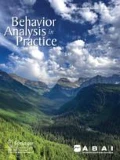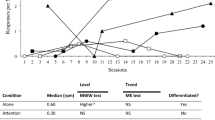Abstract
Tarbox et al. (2020) offered preliminary functional analyses and practical guidelines for incorporating acceptance and commitment therapy (ACT) within the scope of practice of applied behavior analysis (ABA). Although we agree that this is a needed goal, the approach taken by the authors gives rise to important conceptual, ethical, and practical concerns that warrant further discussion. In particular, we propose that explicit functional assessment of behavior (FA) is necessary in any intervention said to be ABA, and we wonder about the apparent omission of explicit FA throughout the article. We question what we read as the authors’ tacit assertion that the functions of verbal stimuli can be inferred based on behavioral topography, that the function of verbal behavior can likewise be inferred based on form, and that behavior–behavior relations are both causal and predictive of behavior, irrespective of context. Furthermore, we consider whether a number of procedures for functional assessment presented in the article under consideration are consistent with established ABA best practices. Finally, we discuss the extent to which ACT interventions absent explicit FA in ABA interventions introduces the possibility that the interventions may do harm, arguing that further discussion around competence and scope of ethical practice for behavior analysts who wish to incorporate ACT into their work is needed.

Similar content being viewed by others
References
Behavior Analysis Certification Board (BACB). (2014). Professional and ethical compliance code for behavior analysts. Littleton, CO: Author.
Behavior Analysis Certification Board (BACB). (2020a). Ethics code for behavior analysts. Littleton, CO: Author.
Behavior Analysis Certification Board (BACB). (2020b). Recommendations for respecializing in a new ABA practice area.
Behavior Analysis Certification Board (BACB). (n.d.). BACB certificant data. Retrieved September 25th, 2020, from https://www.bacb.com/bacb-certificant-data/.
Callahan, K., Foxx, R. M., Swierczynski, A., Aerts, X., Mehta, S., McComb, M.-E., Nichols, S. M., Segal, G., Donald, A., & Sharma, R. (2019). Behavioral artistry: Examining the relationship between the interpersonal skills and effective practice repertoires of applied behavior analysis practitioners. Journal of Autism & Developmental Disorders, 49(9), 3557–3570. https://doi.org/10.1007/s10803-019-04082-1.
Cooper, J., Heron, T., & Heward, W. (2019). Applied behavior analysis (3rd ed.). Pearson.
Fryling, M. J., & Baires, N. A. (2016). The practical importance of the distinction between open and closed-ended indirect assessments. Behavior Analysis in Practice, 9(2), 146–151. https://doi.org/10.1007/s40617-016-0115-2.
Hanley, G. P. (2012). Functional assessment of problem behavior: dispelling myths, overcoming implementation obstacles, and developing new lore. Behavior Analysis in Practice, 5(1), 54–72. https://doi.org/10.1007/BF03391818.
Hayes, L. J., & Fryling, M. J. (2009). Overcoming the pseudo-problem of private events in the analysis of behavior. Behavior & Philosophy, 39–57.
Hayes, S. C., Brownstein, A. J., Zettle, R. D., Rosenfarb, I., & Korn, Z. (1986). Rule-governed behavior and sensitivity to changing consequences of responding. Journal of the Experimental Analysis of Behavior, 45(3), 237–256. https://doi.org/10.1901/jeab.1986.45-237.
Iwata, B. A., Dorsey, M. F., Slifer, K. J., Bauman, K. E., & Richman, G. S. (1994). Toward a functional analysis of self-injury. Journal of Applied Behavior Analysis, 27(2), 197–209. https://doi.org/10.1901/jaba.1994.27-197.
Kissi, A., Hughes, S., Mertens, G., Barnes-Holmes, D., De Houwer, J., & Crombez, G. (2017). A systematic review of pliance, tracking, and augmenting. Behavior Modification, 41(5), 683–707.
Leaf, J. B., Leaf, R., McEachin, J., Taubman, M., Ala’i-Rosales, S., Ross, R. K., Smith, T., & Weiss, M. J. (2016). Applied behavior analysis is a science and, therefore, progressive. Journal of Autism & Developmental Disorders, 46(2), 720–731. https://doi.org/10.1007/s10803-015-2591-6.
LeBlanc, L. A., Heinicke, M. R., & Baker, J. C. (2012). Expanding the consumer base for behavior-analytic services: Meeting the needs of consumers in the 21st century. Behavior Analysis in Practice, 5(1), 4–14. https://doi.org/10.1007/BF03391813.
LeBlanc, L. A., Sellers, T. P., & Ala’i, S. (2020a). Building and sustaining meaningful and effective relationships as a supervisor and mentor. Sloan Educational Publishing.
LeBlanc, L. A., Taylor, B. A., & Marchese, N. V. (2020b). The training experiences of behavior analysts: Compassionate care and therapeutic relationships with caregivers. Behavior Analysis in Practice, 13(2), 387–393. https://doi.org/10.1007/s40617-019-00368-z.
Sandoz, E. K., Bouillion, G. Q., & Rachal, D. O. (2020). Second and third wave behavior therapies. In M. Fryling, R. A. Rehfeldt, J. Tarbox, & L. J. Hayes (Eds.), Applied behavior analysis of language & cognition: Core concepts and principles for practitioners (pp. 250–263). Context Press.
Tarbox, J., Szabo, T. G., & Aclan, M. (2020). Acceptance and commitment training within the scope of practice of applied behavior analysis. Behavior Analysis in Practice, 1–22. https://doi.org/10.1007/s40617-020-00466-3
Taylor, B. A., LeBlanc, L. A., & Nosik, M. R. (2019). Compassionate care in behavior analytic treatment: Can outcomes be enhanced by attending to relationships with caregivers? Behavior Analysis in Practice, 12(3), 654–666. https://doi.org/10.1007/s40617-018-00289-3.
Zettle, R. D., & Hayes, S. C. (1982). Rule governed behavior: A potential theoretical framework for cognitive therapy. In P. C. Kendall (Ed.), Advances in cognitive-behavioral research and therapy (pp. 73–118). Academic Press.
Author information
Authors and Affiliations
Corresponding author
Ethics declarations
Conflicts of interest
The authors report no conflicts of interest.
Research involving Human Participants and/or Animals
N/A; There were no data collected for the publication of this manuscript.
Informed consent
N/A; There were no data collected for the publication of this manuscript.
Additional information
Publisher’s Note
Springer Nature remains neutral with regard to jurisdictional claims in published maps and institutional affiliations.
Rights and permissions
About this article
Cite this article
Sandoz, E.K., Gould, E.R. & DuFrene, T. Ongoing, Explicit, and Direct Functional Assessment is a Necessary Component of ACT as Behavior Analysis: A Response to Tarbox et al. (2020). Behav Analysis Practice 15, 33–42 (2022). https://doi.org/10.1007/s40617-021-00607-2
Accepted:
Published:
Issue Date:
DOI: https://doi.org/10.1007/s40617-021-00607-2




